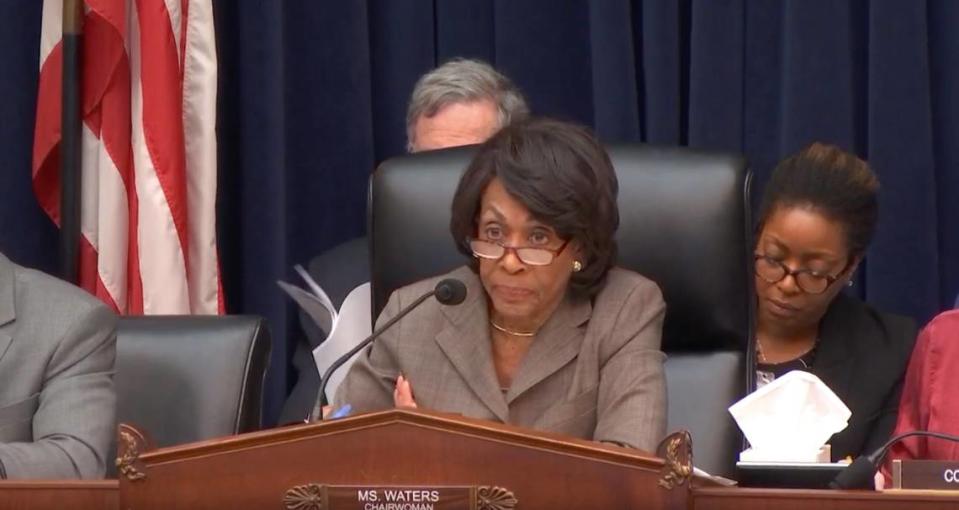Wells Fargo CEO dodges fireworks in his first Congressional hearing
Something unusual happened in the U.S. House Financial Services Committee Tuesday. A Wells Fargo CEO testified and there were few fireworks, few gaffes and few controversies.
In his first performance on a major stage, new Wells Fargo CEO Charlie Scharf dodged the fate of his predecessors Tuesday, receiving a cautiously optimistic reception by the committee’s Republicans and a skeptical one by the committee’s Democrats.
That’s a stark change from the performance of his predecessors, who both resigned shortly after appearing in front of a hostile, angry Congress.
“I genuinely believe that Wells Fargo is an important institution for this country. I really do,” Scharf said. “And just because the company has not been well run, doesn’t mean it can’t be well run.”
Taking office in October, Scharf’s brief tenure was a distinct advantage as he was not around when the bank’s sham sales scandal occurred. The bank has struggled to recover from the revelation that, from 2002 to 2016, it committed a wide range of sales misconduct, most notably creating accounts in customers’ names without their consent.
Scharf reiterated his contrite tone, while shying away from the bold statements and timelines of his predecessors. Members of both parties expressed optimism about the future of the bank.
“You now have an opportunity to help us change not only the culture at your bank, but to change the culture across banking,’’ said Rep. Al Green, D–Tex.
Rep. Warren Davidson, R–Ohio, said in the hearing that Scharf seemed like a person who had “the potential to come in and change a very large organization”
Some Democrats, though, were critical of Scharf’s preparation and his repeated deference to his brief time at the company.
“You should’ve been much more prepared in acknowledging and owning what this company has done before,” said Rep. Rashida Tlaib, D–Mich.
Concerns remain
Congress has been one of the sharpest critics of the bank’s practices.
In two reports issued last week, one by the panel’s Democrats and another by the Republicans, committee staff detailed Wells Fargo’s efforts to recover from the revelation of its sales practices.
After their release, the chair of the committee, Rep. Maxine Waters, D–Calif., called for the resignation of the chair of its board of directors, Elizabeth “Betsy” Duke, and board member James Quigley, over concerns about their oversight of the bank. The pair resigned Sunday, but are still on track to testify before the panel on Wednesday.

In February, the bank agreed to a $3 billion settlement to resolve probes into the sales practices. Democrats criticized that settlement as too small.
While generally reserving judgment on Scharf as an executive, some Democrats argued that Wells Fargo was simply too big and too broken.
“I am very concerned that the bank’s pattern of harming consumers appears to persist,” Waters said. “Wells Fargo isn’t ready to be America’s bank again.”
Republicans, though still critical of the bank’s past practices, were less adamant that Wells Fargo isn’t a sustainable enterprise.
‘Grossly mismanaged’
“We know breaking up the bank is not the answer,” said N.C. Rep. Patrick McHenry of Cherryville, the top Republican on the panel. “Wells Fargo isn’t too big to manage. The findings of these documents was that it was grossly mismanaged”
Scharf, in his prepared testimony, said he has “no preconceived notions about what size our company should be” and he was considering “additional changes” to the bank’s business model.
After the hearing, Waters asked U.S. Attorney General William Barr to review last year’s testimony from then-Wells Fargo CEO Tim Sloan to determine if he had “knowingly and willfully (made) a false statement to Congress.” The Democrats’ report found that Sloan gave “inaccurate” and “misleading” to the committee.
Sloan said the bank was “in compliance” with a 2018 consent order from the bank’s federal regulator, relating to a product it offered. That wasn’t true, the Democrats’ report said, citing the regulator. A spokesman for the Department of Justice declined to comment. Josh Cohen, a lawyer for Sloan, called Waters’ allegations “completely unfounded.”
While headquartered in San Francisco, Wells Fargo has 27,000 workers in Charlotte, a legacy of the bank’s 2008 purchase of Wachovia.

